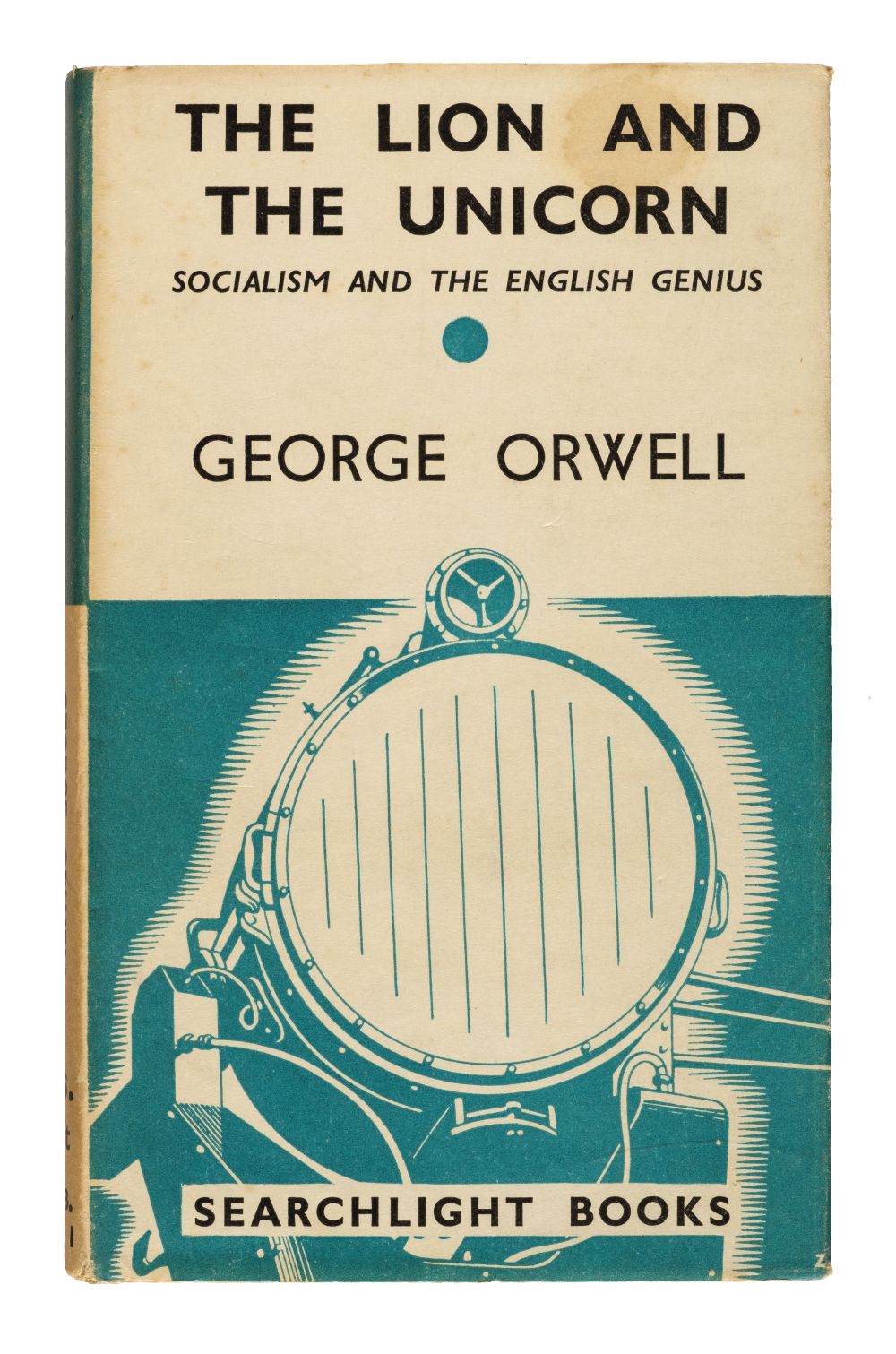GEORGE ORWELL AND THE FABIAN SOCIETY – BLAIR, Eric Arthur (‘George Orwell’, 1903-1950). Autograph manuscript, ‘Culture & Democracy’, notes for a lecture, [1941]. 12 pages, 201 x 163mm (rust stain where paperclipped); [ And: ] Three typed letters signed (‘George Orwell’) to [Billy] Hughes and to the subsequent Secretary of the Fabian Society, London, 2 August 1941, 30 September 1941 and 27 July 1942. 3 pages in total, 202 x 126mm – 240 x 190mm; [ With: ] copy correspondence relating to the organisation of Orwell’s lecture at the Fabian Society and its disputed publication, including 6 outgoing from secretaries of the Society to Orwell (8 items in total). ‘ Culture as we know it [is] inextricably bound up with the survival of democracy ’ : George Orwell ’ s autograph notes and letters relating to his lecture at the Fabian Society on ‘ Culture and Democracy ’ , and the dispute following its publication. The notes opening with a skeleton plan for the lecture: ‘i. Democracy – what it is / ii. No chances of survival/iii. Culture – what it is / iv.Its possible revival under democracy & extinction under fascism’, then continuing with brief points sketching his arguments on the state of democracy (‘Must change because in its present form cannot survive’), why changes to democracy are inevitable (touching on capitalist democracy, the structure of labour, the role of the intelligentsia, pacifism and the attitude to war, and fascism), on the meaning of culture (discussing the importance of art, the ‘upward & downward curves of civilization’, the role of the machine) and its survival (mentioning ‘the necessity of defending our western democratic culture against totalitarianism’, the value of the individual, literature and ‘pro-Fascist’ writers, including Hemingway, and their opposition). The letters relate to the organisation of the lecture, including Orwell’s reluctance to provide a script – ‘I always speak from notes. I could write the lecture out and let you have a copy, but I find that if I do this it gives a sort of stiffness that I try to avoid in speaking’ [30 September 1941] – and his subsequent displeasure upon finding out that alterations had been made: ‘I see that beside toning down several phrases I used you have gone all through my manuscript and altered every phrase which revealed that I was delivering a spoken lecture … it gives a quite false impression of my written style and makes me use phrases which I should never dream of using’ [27 July 1942]. The publication of ‘Culture and Democracy’ in Routledge’s Victory or Vested Interests (1942) with alterations from the original lecture incurred Orwell’s ire, directed towards the Fabian Society, who had borne the responsibility for passing the stenographer’s script to the publisher. The original notes for his speech are here: autograph manuscripts by George Orwell are rare at auction.
GEORGE ORWELL AND THE FABIAN SOCIETY – BLAIR, Eric Arthur (‘George Orwell’, 1903-1950). Autograph manuscript, ‘Culture & Democracy’, notes for a lecture, [1941]. 12 pages, 201 x 163mm (rust stain where paperclipped); [ And: ] Three typed letters signed (‘George Orwell’) to [Billy] Hughes and to the subsequent Secretary of the Fabian Society, London, 2 August 1941, 30 September 1941 and 27 July 1942. 3 pages in total, 202 x 126mm – 240 x 190mm; [ With: ] copy correspondence relating to the organisation of Orwell’s lecture at the Fabian Society and its disputed publication, including 6 outgoing from secretaries of the Society to Orwell (8 items in total). ‘ Culture as we know it [is] inextricably bound up with the survival of democracy ’ : George Orwell ’ s autograph notes and letters relating to his lecture at the Fabian Society on ‘ Culture and Democracy ’ , and the dispute following its publication. The notes opening with a skeleton plan for the lecture: ‘i. Democracy – what it is / ii. No chances of survival/iii. Culture – what it is / iv.Its possible revival under democracy & extinction under fascism’, then continuing with brief points sketching his arguments on the state of democracy (‘Must change because in its present form cannot survive’), why changes to democracy are inevitable (touching on capitalist democracy, the structure of labour, the role of the intelligentsia, pacifism and the attitude to war, and fascism), on the meaning of culture (discussing the importance of art, the ‘upward & downward curves of civilization’, the role of the machine) and its survival (mentioning ‘the necessity of defending our western democratic culture against totalitarianism’, the value of the individual, literature and ‘pro-Fascist’ writers, including Hemingway, and their opposition). The letters relate to the organisation of the lecture, including Orwell’s reluctance to provide a script – ‘I always speak from notes. I could write the lecture out and let you have a copy, but I find that if I do this it gives a sort of stiffness that I try to avoid in speaking’ [30 September 1941] – and his subsequent displeasure upon finding out that alterations had been made: ‘I see that beside toning down several phrases I used you have gone all through my manuscript and altered every phrase which revealed that I was delivering a spoken lecture … it gives a quite false impression of my written style and makes me use phrases which I should never dream of using’ [27 July 1942]. The publication of ‘Culture and Democracy’ in Routledge’s Victory or Vested Interests (1942) with alterations from the original lecture incurred Orwell’s ire, directed towards the Fabian Society, who had borne the responsibility for passing the stenographer’s script to the publisher. The original notes for his speech are here: autograph manuscripts by George Orwell are rare at auction.















Testen Sie LotSearch und seine Premium-Features 7 Tage - ohne Kosten!
Lassen Sie sich automatisch über neue Objekte in kommenden Auktionen benachrichtigen.
Suchauftrag anlegen